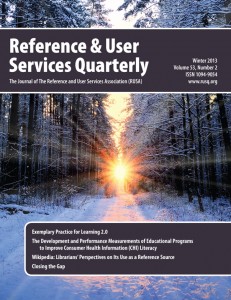Whether you’re looking to gain new skills or refresh your business reference skills, Business Reference 101 (BizRef 101) offered through ALA Reference & User Services Association (RUSA) will help you demystify SIC and NAIC codes, ROI and 10-k’s and feel more confident when faced with business reference questions. The course was a worthy investment and a useful introduction to business resources. Keep reading to meet Celia Ross, the instructor of the course, and learn more about the information covered in BizRef 101.
Celia Ross calls herself the accidental business librarian because she never thought she would be a business librarian. Prior to library school, her resume included stints as a pet shop employee, a school bus driver, a leather craft instructor at a summer camp, and a high school health teacher, but she eventually found her way to the School of Information Science at the University of Michigan. “I chose library school because I like a lot of different topics and didn’t want a graduate school program to mean that I’d have to focus on just one subject area.â€
Ross got her initial experience with company and industry research as a graduate student/intern at a small venture capital firm. With a logic that should give hope to any aspiring business researcher with little or no business experience, the founder of the firm wanted to hire new MSI/MLS graduates rather than MBA’s, thinking that it would be easier to teach the business side of the process to a librarian than to teach the research side of it to business graduates.
Ross went on to work for the Chicago Public Library where she faced business-related questions, then at the fast-paced, high pressure, all business-research-all-the-time environments, McKinsey & Company, as a researcher. But she eventually left McKinsey to return to the [academic] library world, which is where she is happiest and where she can use her skills to the fullest.
Ross’ main mission with both BizRef 101 and Making Sense of Business Reference (the book that grew out of the course) is to help others feel less anxious when faced by a business question and to find new confidence in their overall reference abilities. The quest began over a decade ago when she left her corporate research position to return to the academic world. Ross decided it was time to share the big, eye-opening business research secrets learned in the trenches while working as a researcher at a consulting firm.
The secret: “Even in an environment where money is no object, some business research questions simply cannot be answered, at least not in the way that they have been asked. In other words, it wasn’t just me who was challenged by certain kinds of question . . .  it’s just the reality of business research.â€
A beautiful thing about being a librarian is that we constantly learning from the work we do. We learn the most from our patrons because we cannot predict the questions that will come our way. Ross explains that “some days the curve seems steeper than others . . .  there are days where it feels like new ideas/resources/strategies/data are attacking from every direction, but for the most part the dynamic flow and constant energy are refreshing.â€
In addition to learning from our patrons, librarians can learn from each other embracing lifelong learning through professional development, networking, and continuing education. Ross notes that “joining ALA can seem like a daunting prospect, especially if you’re new to the profession . . . but I was drawn to RUSA because it is inclusive of many types of libraries as well as functional positions within libraries.â€
There is great value in continuing education and professional development. Ross wrote the chapter, “Professional Development Through Teaching,†in the new book Continuing Education for Librarians: Essays on Career Improvement Through Classes, Workshops, Conferences and More, in which she elaborates on her positive experience of being involved with ALA and RUSA and offers suggestions on how other can evaluate their own skill set and perhaps explore teaching as a professional development channel.
There is true value, importance, and benefit of being a member of ALA and RUSA. Ross believes that the “value comes directly from the relationships and networks you will form with your RUSA colleagues. It’s a great group of people and the RUSA community is an incredible place to find your ALA home.
BizRef 101
BizRef 101 and Making Sense of Business Reference grew out of a half-day workshop that Ross developed for Chicago-area librarians. Ross recalls: “About eight years ago, RUSA put out a call for online course ideas and I suggested that I could develop the workshop into a full-fledged online course. ALA Editions, the publishing arm of ALA, reached out to some of the online course instructors to see if we’d like to write a book based on our respective courses.†Ross’ book, Making Sense of Business Reference, was published a few years later–she is glad it took as long as it did because she was able to gain to new skills and knowledge to bring to the book.
I recently completed BizRef 101. The majority of people enrolled in this class felt the need to acquire or improve business reference skills as public, academic, and special librarians and researchers who need to answer business reference questions on a regular basis. Additionally, a number of people in the class are transitioning to new careers or exploring alternative career paths as a researcher or analyst in a legal or corporate environment.
Biz Ref101 is a four-week, Web-based professional development course designed to provide a framework for understanding the business reference process as well as an overview of free resources and access to leading, subscription-based business reference sources, such as Morningstar, IBISWorld, Plunkett Research, ReferenceUSA, and S&P’s Capital IQ NetAdvantage
The course is beneficial because it allows students to explore the resources through database trials and homework assignments including reference questions and exploratory research. This course is a great launch pad for librarians and researchers who possess basic knowledge of business resources but would like further develop business research skills.
BizRef 101 is of great value to anyone looking to further develop business reference skills. Below you will find an overview of the course, including tips and cool resources featured each week. I shied away from crowning a favorite resource because “every database has its own soul†and all databases have different strengths and weaknesses and much depends on your particular situation–setting, patrons, clients, or budget. This is just a sneak peek into the world of BizRef 101. You will have to enroll in the course or purchase Ross’ book In order to learn more about business reference skills and resources.
Week 1 – Company Research
- Company information has many uses, including job search/interview preparation, market research, and consumer issues
- Keep in mind that a lot of company information is not publically available because companies do not want competitors to know how or what they are doing
- Important to know if a company is public or private and parent or subsidiary
Cool Sources
Week 2 – Small Business & Industry Research
- Comprehensive industry research requires a lot of digging and money because it take a lot of time to analyze and compile
- Industry research can be used for starting a business, competitive intelligence, marketing, and career research
- Keep your eyes peeled for terminology, synonyms, major companies, and industry codes
- Ask yourself “WHO CARES?†about this information—this will help you locate answers to business reference questions
Cool Sources
- SCORE “Counselor to America’s Small Businessâ€
- Business Plans Handbook
- MarketResearch.com
- Vault.com
- Harvard Business School Baker Library Industry Overview Index
Week 3 – International Business Research, Consumer Research, and Business Statistics
- Consider differences in language, legal systems, and culture
- The United States Government tracks a lot of international data
- There is a difference between the words Marketing and Advertising
- Consumer research can be tricky so start broad, then narrow down your search
- Stats can be found almost anywhere, but just because there is a number does not mean the number is good or correct
Cool Sources
- National Retail Foundation
- BRASS “Best of the Best†International Business Sites
- Doing Business In…
- USA.gov
- Statistic Brain
Week 4 – Stocks and Investment – Basics of investing and strategies for finding market information, including historical stock data and data on defunct entities.
- Find a source you like best for quick searchers (and reliable information)
- Many free sites give basic data, e.g. Yahoo Finance and MSN Money
- Many fee-based online services also have some free content, e.g. Value Line and Morningstar
Cool Sources
Rather than being paralyzed by fear when you receive a business reference questions, keep in mind that you already hold the power to answer business reference questions. A thorough reference interview is the key to a successful [business] reference transaction. Guided by our fearless leader, Celia Ross, we were reminded to use our skills and intuition to navigate the way through the business reference process.
In closing, and since I am writing this article on behalf of INALJ, I had to ask Celia for her best piece of job hunting/career advice.
Get practical experience whenever and wherever you can–classes are important, but internships and practicums during library school can really impact your career trajectory. Expand your search for these opportunities beyond the traditional library framework and be open to anything. Get involved with RUSA, SLA, and your state and local library groups. The people you meet through these groups will not only form an invaluable network for you, but some of them may become friends and/or mentors.
I am inspired and motivated by Celia’s words of wisdom and awesome career path. I can totally relate to her reasons for finding her way to library school. I, too, have a lot of interests and I didn’t want to choose a limited career path. Librarianship opens to doors for so many opportunities–it’s just a matter of selling skills, talents, and passions.
I am especially impressed with the fact that she has worked in public, academic, and special libraries. It goes to show that librarians have the skills to transcend disciplines and career paths and we do not have to be pigeon-holed into one kind of librarianship. Thank you, Celia, for confirming my beliefs!

